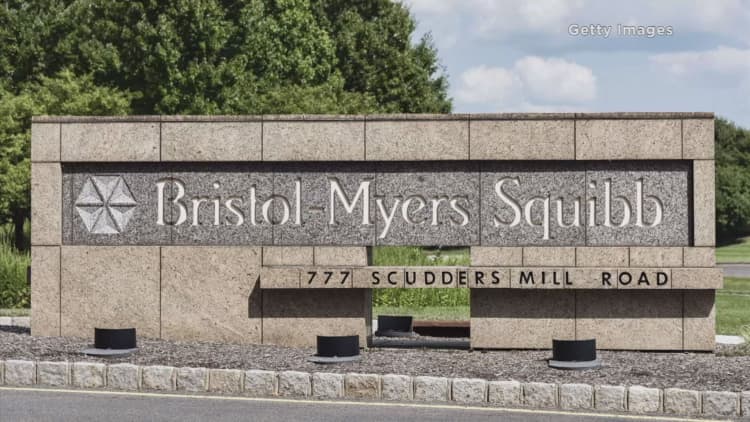
Shares of Bristol-Myers Squibb plunged more than 17 percent in morning trading Friday after its important cancer drug failed to meet targets in a late-stage study.
Shares of Bristol-Myers' competitors who have their own versions of the cancer therapy rose on the news. Bristol-Myers' shares ended the day down nearly 16 percent, while shares of Merck surged more than 10 percent.
Bristol-Myers' drug Opdivo, which is already approved to treat some types of cancer, before Friday was seen as a treatment that could significantly boost the company's growth.
In the study known as CheckMate -026, the company was trying to see if Opvido would be successful in treating "a broad patient population" of people with advanced non-small cell lung cancer, which accounts for the vast share of lung cancers. Up to 200,000 people in the United States are annually diagnosed with non-small lung cancer, which is often fatal.
Bristol-Myers CEO Giovanni Caforio said in a release that he was "disappointed" with the result but management remains "committed to improving patient outcomes through our comprehensive development program." Caforio also pointed to another ongoing trial, called CheckMate -227, of Opdivo in combination with the therapy Yervoy, as well as Obdivo combined with chemotherapy.
"We believe that combination therapy may provide an important opportunity to address the needs of every patient with first-line lung cancer," the company said.
Opdivo had sales of $840 million in the recently ended quarter, which was $718 million more than in the same quarter in 2015.
Dr. Mark Schoenebaum, a biotech and pharmaceuticals analyst at Evercore ISI, in a note called the Opdvio trial results "a major surprise — possibly the biggest clinical surprise of my career."
"Investors had high expectations for this trial." Schoenebaum wrote, noting that there was a consensus view that Opdivo would have sales for all kinds of treatments of around $12 billion by 2021, "with perhaps" $7 billion to $8 billion of that coming from the drug being used to treat non-small cell lung cancers either by itself, or in conjunction with other therapies."
If the 17-percent drop is sustained Friday, it would represent the second-biggest daily percentage loss for Bristol-Myers shares, and lop off $21 billion in market cap. The company's stock fell by 22.4 percent on April 19, 2000, when Bristol-Myers withdrew an application for a hypertension treatment from the federal Food and Drug Administration after the agency expressed safety concerns about the drug.
As of intraday trade, shares were more than 8 percent lower for the year so far.
Shares of Dow component Merck, which offers a competing drug called Keytruda, surged more than 6 percent in morning trade after the news about Opdivo. Analysts have said Keytruda — which recently met its target in its own late-stage study — could dramatically increase Merck's sales over the next decade.
"Both of them have had good trials in the past. Now one of the trials for the drugs shows it might not be as effective," said Jonathan Wexler, chief sales officer at BioShares.
AstraZeneca, which also offers a competing drug, saw its shares rise more than 1 percent in morning trade.
He said the stock reaction was an "extremely significant move" and the news will be watched for impact to balance sheets.
"This is an extraordinarily fortunate outcome for Merck's Keytruda," said BMO Capital Markets analyst Alex Arfaei. "This is a seismic event in terms of market share implications."
In a statement, a Merck spokeswoman declined to comment on Bristol-Myers' study.
"We cannot comment on their findings as the full results have not yet been disclosed," she told CNBC in a statement.
Bristol-Myers shares were downgraded to "neutral" from "buy" by SunTrust Robinson Humphrey on the news, with the firm saying it was lowering its price target for the stock from $86 per share to $68.
Jefferies likewise revised its outlook on the company, saying, "We see Bristol-Myers down $7-$10/share in this scenario."
But Jefferies also said, "The CheckMate -227 study for Opdivo/Yervoy presents another shot on goal."
Damien Conover, equity analyst at Morningstar, went farther that that.
He said that Bristol-Myers will be set back for one to two years, but is bullish on its potential in the immuno-oncology market.
"We still think Opdivo gets the lion's share of the market but ... right now immuno-oncology drugs [have] a lot less side effects, and for some patients [they were] remarkably effective," Conover. "Going forward, I think you need more combination assets to treat those sort of folks, but I don't think this really changes the outlook for immuno-oncology drugs. We still have strong conviction in these drugs."
Bristol-Myers Squibb 12-month performance
Source: FactSet


